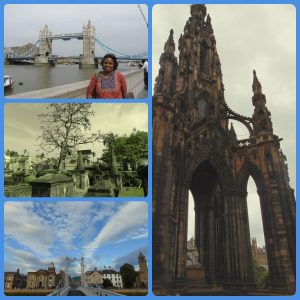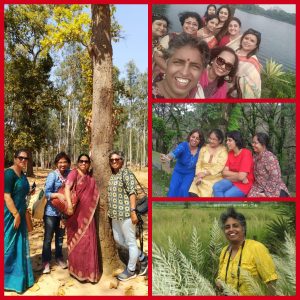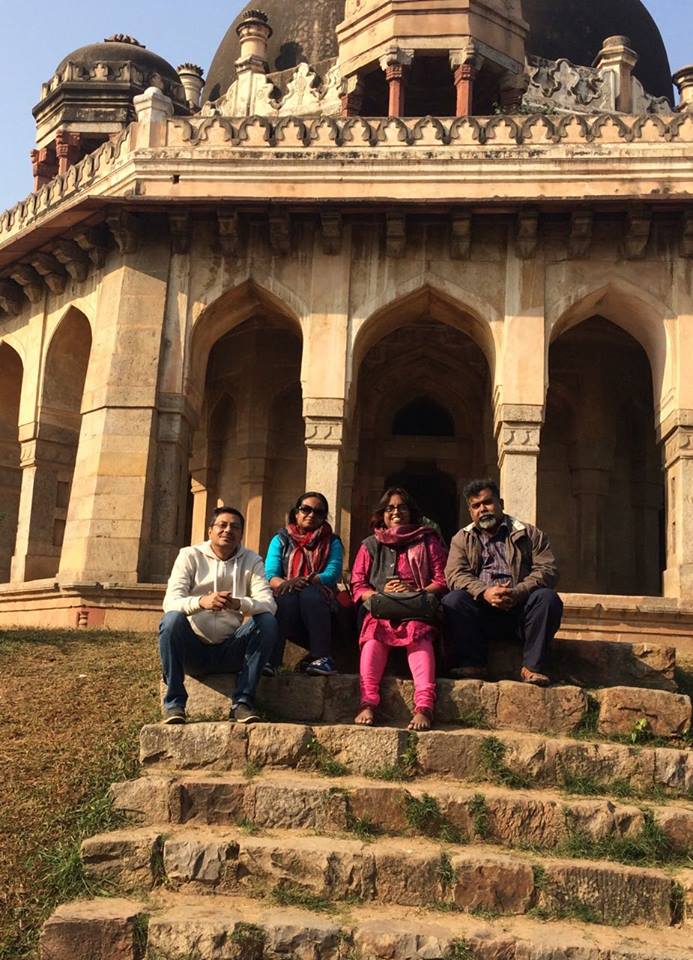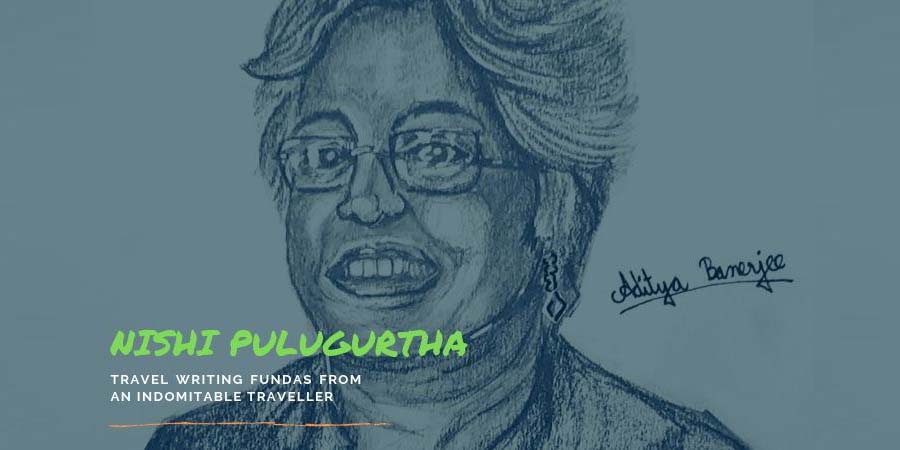My friend Nishi happens to be quite an inexplicable person; even while we were in the university together I often wondered how she managed to pack so much into a single day of standard dimensions, and still remain cheerful and uncomplaining about almost everything around her. I still do not have an answer to that.
She loves to travel; and write about it. I would rather say she loves to connect and muse about it. One of the best observers of life that I have met, she is so loaded with her infectious brand of enthusiasm, that with her, you can’t help but feel elated.
This all-encompassing affection reflects in her travel writing too. I started reading her short pieces for the first time when she started sharing some of her work with ‘Cafe Dissensus’ and some other news publications in our university friends' Whatsapp group. Let’s just say I would love to be able to think like her.
She edited one issue of Cafe Dissensus last year, on travel writing.
That blog has a tagline, ‘We Dissent’, which I personally find to be very uncharacteristic of Nishi. Her sense of dissent, if any, comes across as somewhat imperceptible. Rather, she makes us all assent with her charming demeanor and easy-going ways.
Anyways, that special edition mag was quite an eye opener in its sheer variety of perspectives from which one could see the genre of Travel Writing.
You can click on the image below to sample those musings – if you want to.

I sure am worried with the frenetic pace in which she is gaining popularity; our Nishi will soon become everyone’s Nishi. Before that happens, and she stops being out in the open, I thought of asking her a few questions about what is it that makes her travel, and how she writes about it.
For all my readers who want to get into Travel Writing, this is a treat worth savoring.
- What makes you travel?
The desire to be out, to relax, to see more, to know more, to explore; I have travelled for work, conferences and seminars and have many a times been able to squeeze in a little bit of exploring the place I am in.
As children we travelled to go to our “desh,” our home town, Kakinada in Andhra Pradesh. “Desh” was the way most of our neighbours described it, my parents found it strange, but then realized in this instance ‘desh’ was not country but “home” or hometown.
- Do you think the idea of travel could work to re-present one’s lived place?
Yes, I do. Calcutta/Kolkata is home and I am fairly familiar with the city, its roads, buildings and places. However, I have been rediscovering my city when I do heritage walks. There have been some streets that have been so familiar to me, I have often travelled along them, yet I have discovered new facets, buildings, histories and stories about them that have left me surprised and excited.
- Can the familiar and well-known take on a charm so very different – as a result of travel?
Yes, it surely can, like I mentioned above.
- Give me an example, from your own travel experience - to illustrate how people and places seem to interact to create a sense of lived experience?
My first trip abroad was in 2007 to Germany for a Conference. I was to stay with a young student in the university town of Jena. My New Delhi to Frankfurt flight was delayed and I reached Jena much later than scheduled. I needed to change trains twice to reach Jena. Nadja was to receive me at the train station, however due to a miscommunication she was not there. As I came out of the station, I encountered the great fascination that Germans had for football. A university football match had just got over and there were students all over. I approached one of them. I needed to use his mobile to make a call. His friend came over and they made the call to Nadja who would be taking some time to come over. The four young men and women starting talking to me and were very interested in knowing more about me and the country I came from. They were young undergraduate students who invited me for dinner if I as comfortable with the idea. I went along, I felt nothing amiss. It was a simple dinner with these four young people. We spoke for quite some time about education, about the conference I had come to attend and other issues. I deal with students here in Kolkata and it was really nice to interact with these young students in another country and clime. They are just the same everywhere, very enthusiastic, bubbling with ideas and willing to learn. I did learn much about their education system and life in the university town from them.
- What role do memory and nostalgia play in travel?
Nostalgia and memory play an important role when it comes to travelling down South to visit my relatives. They did not earlier when I was a kid, they do now.
Memory comes in at times when I have read about some place somewhere and am travelling there, experiencing the place now in my way, perhaps.
They play a greater role when I sit down to write.
- For you, personally, does writing about travel bring about a re-living of the whole experience?
Yes, it surely does.
- How does the purpose or nature of travel determine itineraries? Say when you went to Scotland – would you have visited the same places if you went for a different purpose – say a trip with friends?
I have travelled mostly for fun and relaxation. However, there have been trips that I did because of a conference or seminar somewhere. Had I done those trips simply for the sake of travel, I think my itinerary would still be more or less the same. For instance, in my Scotland trip, I would still have visited the same places that I did when I went there for a Conference with one exception, that being the place of my Conference.

- Do images/narratives/ descriptions produced by travelers influence or present constructions of identity?
Yes, they do. The way travelers write about the places and people depends on their perspective and ideology, and that surely colors the way they construct identity. This is seen in colonial travel narratives written by the English (in the case of India). Colonialism defined social and cultural paradigms in new ways and travel became an integral part of fashioning the colonial modernity.
- What is the role of travel writing in colonialism? You do travel a lot locally – so a couple of local examples to illustrate the point (like your trip to Chinsurah) would be great.
Travel writing had an important role to play in colonialism. It is all about constructions of identity, about the colonial gaze and representation.
I like travelling not just to distant places, but to the known and familiar too. History fascinates me and hence I have often travelled to places nearby Kolkata, like Chandanagar and Chinsurah with a desire to explore the colonial legacies these places have. Places within Kolkata too that have a colonial past – Kutighat and the South Park Street Cemetery comes to mind.
- How does travel writing work to present the little known or almost forgotten places and people?
I believe travel writing works since it talks about the known and the unknown, the familiar and the unfamiliar, about people, places and lands. Since time immemorial it has always excited and enticed people. I think it makes one travel vicariously.
- At a time when more and more women are beginning to travel alone or in women-only groups for pleasure, how do their experiences of travel add to the genre of travel narratives?
The solo woman traveller is a relatively new phenomenon and it is interesting to see more and more women doing it. I, myself, have been a solo traveller in all my trips abroad and have thoroughly enjoyed them. Right from planning out the trip, to making all necessary arrangements and travelling is great fun. It is liberating and very relaxing too. I believe we can have more travel narratives by women that would surely add to the genre. I do not think it would be much different to narratives by men.

- Could travel writing be gendered?
I don’t think so. I think maybe travelling alone is gendered. However, I think that is changing too.
- Any advice for upcoming travel writers – what are the traits they need to develop?
I think what is important is being able experience every little bit that comes in one’s way while travelling. Keeping an open mind, relaxing, enjoying, observing, and making notes, visual notes too and yes, by having fun while travelling. And yes, reading.
 The person who said advertising is the most fun you can have with your clothes on didn't travel for sure. And yes, credit for that image goes to my dear friend Papia's facebook page.
The person who said advertising is the most fun you can have with your clothes on didn't travel for sure. And yes, credit for that image goes to my dear friend Papia's facebook page.
That’s a bit long. Nonetheless, mark my words, every point she made will help you in your own travel-writing endeavours. It came out of pure field practice.
For me, I am seriously thinking of starting a separate section on ‘travel’ very soon. I even have a name for it; would call it, when it’s born, TIME TRAVEL.
If and when I begin, I aim to start with Nishi’s piece; perhaps she will kindly agree to write about her experiences with whiskey making in Scotland.
That’s something worth waiting, for sure.
 At the steps of a Lodhi Gardens monument, when Nishi came visiting Delhi.
At the steps of a Lodhi Gardens monument, when Nishi came visiting Delhi.
Couple of winters back.



Great piece. Look forward to the book launch on Saturday.
Me too. Will be there in spirit …
Thank you so much Rana.
How about the idea of creating a TIME TRAVEL segment Nishi? Winter is coming …